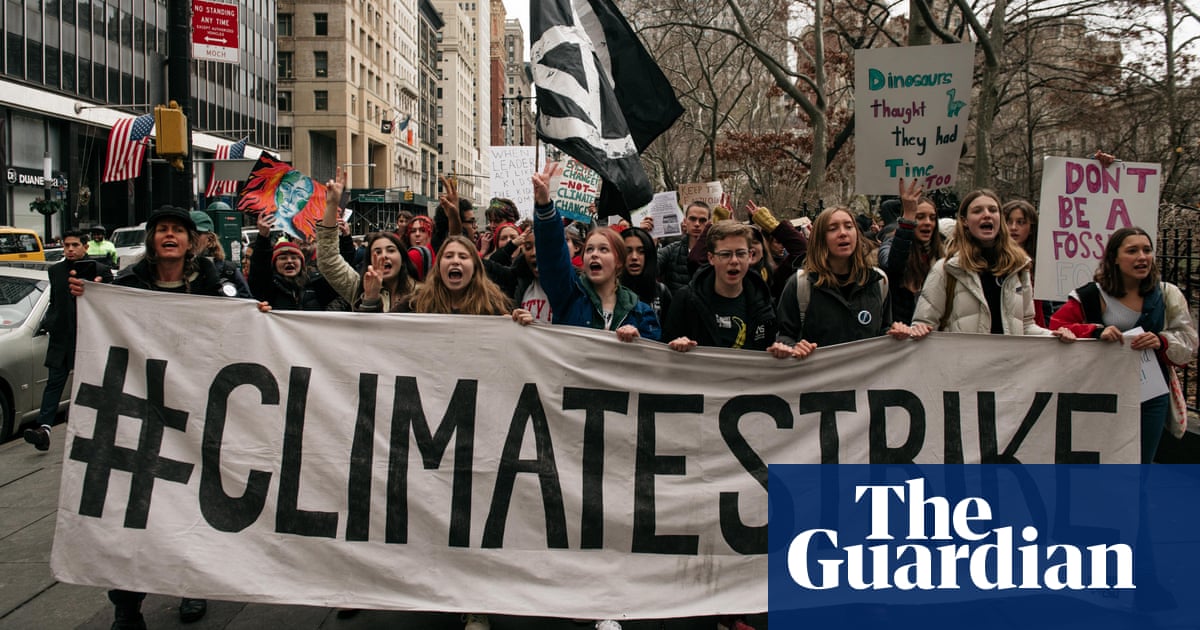Organizers in the youth climate movement plan an avalanche of activities beginning next week, determined to make the future of the climate the major issue of the 2020 election.
Capitalizing on turnout in the September climate strikes, when 6 million people worldwide turned out to demand urgent action to address the escalating ecological emergency, young US organizers are making the leap from mobilization to demands. They’re planning widespread voter activation in the 2020 US presidential election as well as direct action targeting the fossil fuel industry and the banks and politicians that enable it.
“The headline message of the strikes in 2020 is: the kids are taking to the streets to strike for climate and they’re asking you to vote,” said Katie Eder, the executive director of Future Coalition, a communications and training hub for youth climate groups.
There are more than 300 organizations involved in the efforts, Eder said, including some of the largest youth and adult coalitions in climate movement: Fridays for Future, the Sunrise Movement, 350.org, Zero Hour, Extinction Rebellion.
“We’re starting to have the conversation within the strikes about how we’re balancing both the political targets and the financial targets,” Eder said, calling power and money “really key to the root causes of why we’re not addressing climate change”.
Activists have planned widespread voter mobilization campaigns; three days of national strikes, marches, and direct action against politicians and banks beginning on Earth Day (22 April); regular strikes on Fridays and additional strikes targeting primary elections in every state; plus an international day of action, college divestment campaigns, and a huge push by the Sunrise Movement to turn out the vote for Bernie Sanders and a Green New Deal.
Stories of climate awakening are a universal truth for young Americans living in the age of worsening climate conditions. Isabella Fallahi, who has asthma, for example, has lived within 14 miles of a coal-burning generating facility all of her life.
“A lot of people don’t think of Indiana, or the midwest, for that matter, as frontline communities,” she said. “We face the silent killers. The terrible air quality because of mining projects, the terrible water quality because of mining projects, the health effects associated with both of those, droughts that cripple the agricultural economies that we’re based off of.”
But Fallahi, like many other young organizers, is also galvanized by the tech proficiency of her generation, born into the era of hashtags and the ubiquitous touchscreen. She was a speaker at the UN climate change conference in Madrid (COP 25) in December 2019, when she and other youth were nearly ejected for protesting against the fossil fuel executives on panels and in negotiations.
Approximately 200 young people in 40 countries, many of whom were at the conference, organized a response called Polluters Out. In 20 days, they had a website, a multilingual launch video, a press release in seven languages, and a list of demands. In actions set for March, they will call for the exclusion of fossil fuel interests at COP26 and transparency in the UN framework on climate change, as well as inclusion of indigenous and human rights in the Paris agreement. Regional efforts in the US will also call for a Green New Deal, a halt to new fossil fuel infrastructure, divestments from fossil fuels by universities and campaign funds, and the targeting of specific banks for fossil fuel investments.
The groups stay in touch through conference calls, Slack, Zoom, and Google Drive. Activists in Cuba – who can’t download the apps because of the US trade embargo – tune in through WhatsApp. There’s a Slack channel for supporting scientists, too. And meetings wait for organizers in the Amazon who need to travel to towns for internet access.
For all of them, there is community. People to cry with over the photo of the bay in Australia, so covered in smoke that it is hardly visible.
“Overall, I think the way to look at this perspective on the youth movement is: it is cohesive in that they do communicate, but the orgs are not all the same,” said Natalie Mebane, associate director of US Policy for 350.org and an adult mentor for Zero Hour, both organizations intensely focused on voter turnout for climate for 2020. “We want to make sure that climate becomes the number one issue on voters’ minds.”
The Sunrise Movement, like 350.org and Zero Hour, has taken that to a grassroots level. That is how Naina Agrawal-Hardin ended up in the guidance office at Washtenaw high school outside Ann Arbor, Michigan, for an interview. She’s a leader for the Ann Arbor hub of the Sunrise Movement. And she’s 16, a junior. Her school, she said, was supportive.
“Whenever I have to take conference calls or interviews during school hours, they usually will write me a pass to get out of class,” she said.
Agrawal-Hardin is planning a watch party at her home – a sneak peek at the forthcoming documentary Generation Green New Deal and a video about the Sunrise Movement’s 2020 campaign, as part of its annual kickoff. Sunrise provides the documentaries, discussion questions, and near-daily training on organizing and recruitment techniques. When Agrawal-Hardin hosts her event on 29 January, she’ll be one of more than 2,000 hosts nationwide.
Through 2020, the Sunrise Movement will similarly activate its 300 chapters in support of Bernie Sanders, leveraging 10,000 volunteers in most of the 50 states for door knocks, voting pledges and climate education. Sunrise endorsed Sanders as the best-positioned candidate to lead a Green New Deal and address income inequality.
“By primary/caucus day in Iowa and New Hampshire, we are going to have over 20,000 young people who have signed pledges to vote for Green New Deal champions” in the two states, said Sofie Karasek, a Sunrise Movement spokesperson. “What we’re really expecting to see in 2020 is Young Green New Deal voters really become the margin of victory for whoever becomes the Democratic nominee.”
Source: Climate change | The Guardian





